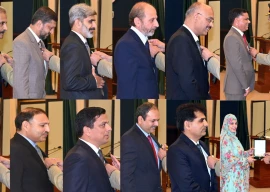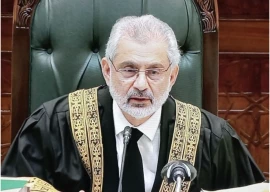
Some of the Karachi-based members of the lawyers group which formulated the amendments to the laws shared the changes with the civil society in an interactive session on Friday. It was called Aurat Foundation's Legislative Watch Programme for Womens Empowerment.
Sindh Assembly Deputy Speaker Shehla Raza took this opportunity to announce that the domestic violence bill, which has been pending for quite some time, will be introduced in the next session of the Sindh Assembly. “I will ensure that it is passed,” she promised to hall packed with people. Besides, Raza, other speakers included Justice (retd) Shaiq Usmani, Supreme Court Advocate Iqbal Haider, Justice (retd) Majida Rizvi, Advocate Maliha Zia Lari and Haq Nawaz who were part of the effort.
Justice Usmani said that aim of the consultation was to share the proposed amendments in the Pakistan Penal Code (PPP) and the Code of Criminal Procedure (CrPC), with human rights activists. The amendments will be passed on to the National Assembly in the form of Criminal Law (Amendment) Act 2012 later in the year.
Lari pointed out that since the PPC and CrPC were federal subjects the amendments will be forwarded to the national assembly. “We want to start a movement for pressuring the government to pass the law to help stop the horrendous number of killings.”
While reading the amendments out loud to the audience, Justice Usmani said that he was disgusted by the word honour. “How can it be called ‘honour killing’?” he asked.
Justice Rizvi said that compensation was acceptable for ordinary crimes but not for honour killing. Her argument was that in these cases, usually it was families of the victim who hold them kari and are responsible for the murders.
Rizvi also pointed out that in the Islamic laws of Qisas and Diyat, were only applicable after the murderer was convicted. The problem was that the law was being used to let the perpetrator off the hook. The existing law does not indict jirgas or illegal parallel justice systems which handed out punishments. The amendments proposed took this into account by declaring the offense non-compoundable.
A discussion also broke out amongst the participants on whether the perpetrators of honour killings should be given death penalty. The human-rights activists have lately been calling for abolishing the death sentence. While some participants called for a ‘double death sentence’ for honour crimes, the speakers chose to evade to topic.
However, minister for women development, Tauqeer Fatima Bhutto, believed that the criminals should be made to die painfully for the murders of women. “Honour killing is neither a part of our religion or culture,” she said. “The murderers should be killed in the same manner in which they kill women.”
At the end of the session, Advocate Iqbal Haider highlighted what he said were ‘painful omissions’. “Neither the National Assembly nor the Senate passed a single resolution condemning honour killings,” he said.
Published in The Express Tribune, June 9th, 2012.






































COMMENTS
Comments are moderated and generally will be posted if they are on-topic and not abusive.
For more information, please see our Comments FAQ